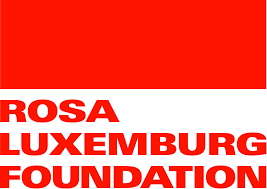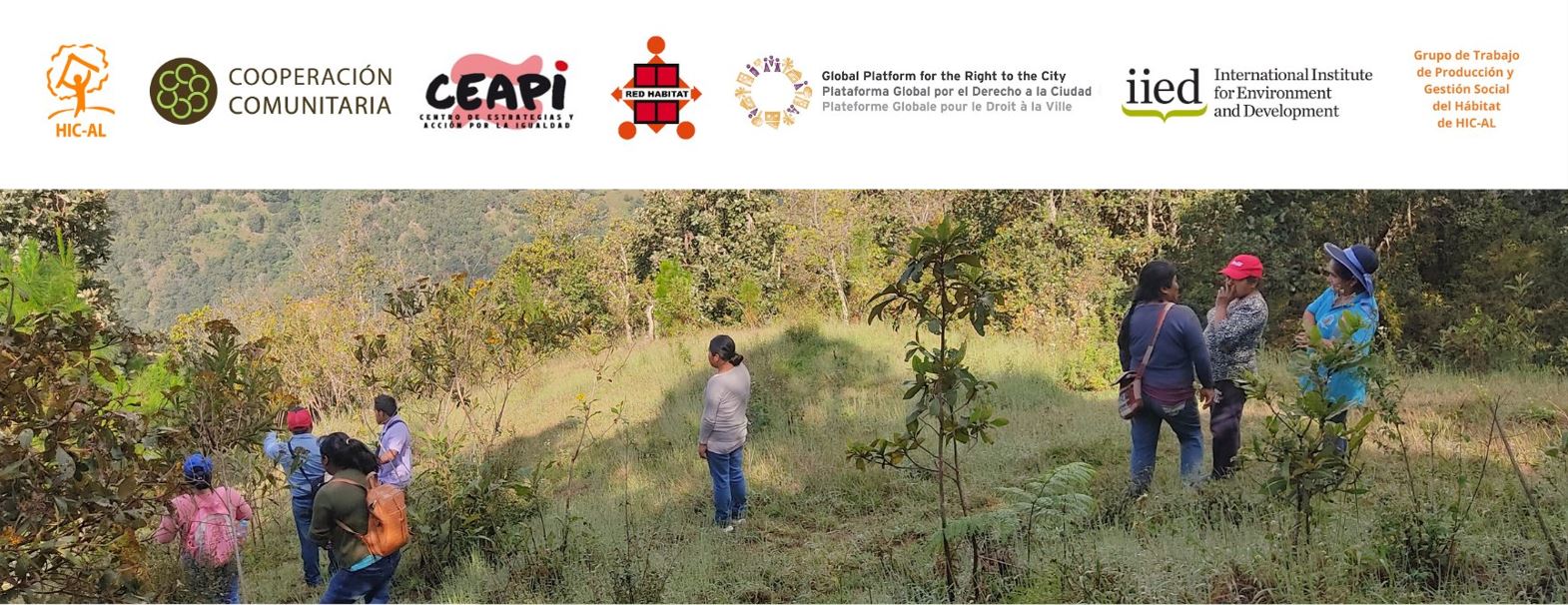From local responses to the international debate to be held on the 15 and 16 of november, 2023
Overarching Objective: To strengthen the exchange of experiences, alliance building and coordination among social actors in Latin America and other regions that work towards habitat related human rights to advance climate justice.
Specific Objectives:
1. Facilitate the exchange of community-led climate action in urban and rural areas focused on pursuing climate justice.
2. Highlight the responses that the identified community-led climate action can offer regarding prevention, mitigation and adaptation to climate change as well as in a post-disaster reconstruction, and to outline proposals to be contemplated at international climate discussions.
Registration: Use the following link to participate on-site or remotely (for online participants the access link will be sent via e-mail a few days before the event).
November 15 9:30 a.m. to 6:00 p.m. (Check your local time here)
9:30 Registration (the morning activity will have Portuguese-Spanish and English-Spanish translation and vice versa). (Check your local time here)
9:45-10:00 Welcome, Maria Silvia Emanuelli (HIC-AL), Lorena Zarate (Global Platform for the Right to the City), Anne Katharina Gerigh (Global Nature Fund), Anelise Meléndez (Red Hábitat) (Check your local time here)
10:00-2:05 Session 1. Presentation of Community-led climate action in Latin America (Check your local time here)
10:00-11:40 (Check your local time here)
Exchange between previously selected and physically present urban and rural experiences in Latin America that are climate responsible, holistic, participatory and sustainable over time. Each experience is asked to bring an object or a picture to depict their fight and to answer the following questions in 10 minutes:
How does the picture or object you brought reflect the experience? How is your experience contributing to climate justice? What strategies have worked (indicate up to 3) and what obstacles have you faced (indicate up to 3)?
Experiences:
Argentina:
● Civil Association “La esquina hace arte” and IIED, experience in Villa 20, Buenos Aires.
Bolivia:
● Pro Habitat Foundation, Sustainable urban consolidation, Cochabamba.
● Committee promoting the Socio-Community Climate Agenda and Red Hábitat, experience in
La Paz.
Colombia:
● Natural Reserve and Ecoaldea, Cochahuaira, Municipality of Gachantiva.
El Salvador:
● FUNDASAL, experience “Safe and Healthy Housing”, Municipality of San Pablo Tacachico.
Mexico:
● San Miguel Teotongo, Iztapalapa, Mexico City.
● Communities in the Mountains of Guerrero and Cooperación Comunitaria, Comprehensive Reconstruction of Habitat.
● Corazón de la Tierra Institute, experience in communities in the sierras of Chapala, Jalisco.
● Cooperativa Tosepan, experience “Energy for the Yeknemilis (well being), Sierra Norte de Puebla.
11:40-11:55 Q&A
Moderator: Elis Martinez, Cooperación Comunitaria
11:55-12:10 Coffee Break
12:10-1:50 (Check your local time here)
Exchange between previously selected urban and rural experiences in Latin America with participation online, that are climate responsible, holistic, participatory and sustainable over time. Each experience is asked to bring an object or a picture to depict their fight and to answer the
following questions in 10 minutes:
How does the picture or object you brought reflect the experience? How is your experience contributing to climate justice? What strategies have worked (indicate up to 3) and what obstacles have you faced (indicate up to 3)?
Experiences:
Bolivia:
● Agrecol Andes Foundation, experience in Taquiña/Tirani, Cochabamba.
● Procasha Foundation, experience in District 8, Cochabamba.
Brasil:
● Centro Cultural Quilombo do Catucá ou Ilê Axé Oyá T’Ogum, Pernambuco.
● Chã de Terra Collective, Pernambuco.
● Local communities and Catalytic Communities, experience “Rede Favela Sustentável”, Santa Teresa, Rio de Janeiro.
● Movimento dos Trabalhadores Sem Terra Leste 1 and Polis Institute, experience “Mutirão Paulo Freire” in São Paulo.
Chile:
● Unión Comunal de Comités de APRs de Ránquil, experience in the Ñuble region.
Colombia:
● Xisqua Agroecology School, Cuenca del Lago de Tota.
Costa Rica:
● Association Red de Coordinación en Biodiversidad, experience in the creation of Agroecological gardens.
Ecuador:
● Association of Cooperatives Solidaridad, experience of La Quebrada, Quito.
Perú:
● Groots Network, experience in Agustino, Lima and Lambayeque.
1:50-2:05 Q&A
Moderator: Lorena Zárate, Co-coordinator, Global Platform for the Right to the City
2:05-3:05 Lunch
(Check your local time here)
3:00-5:50 Session 2: Building shared long-term objectives and strategies through dialogue between participating experiences and other interested attendees (this session will not be streamed but zoom participation will be possible)
(Check your local time here)
3:05-3:15 Introduction to the afternoon working session and presentation of key concepts related to climate change and climate justice. (Check your local time here)
Elis Martínez and Diana Cortese, Cooperación Comunitaria
3:15-4:05 Working groups for the construction of scenarios at local, regional and international levels (groups will be formed by people from the different participating experiences and interested attendees. Virtual groups will be organized for those participating via Zoom). (Check your local time here)
4:05-4:55 Working groups to select the actions to be taken to reach the desired scenario. The proposed topics for debate will be: Participation and networking; Advocacy; Local action; Climate justice technologies. (Check your local time here)
4:55-5:10 Coffee Break
5:10-5:50 Plenary
Moderator: Diana Cortese, Cooperación Comunitaria
5:50-6:00 Conclusions and closing of the activity
(Check your local time here)
Elis Martínez, Cooperación Comunitaria
November 16 10:00 a.m. to 2:30 p.m.
(Check your local time here)
9:45 Registration (This activity will be translated Portuguese-Spanish, English-Spanish and vice versa) (Check your local time here)
10:00-10:10 Welcome and recap of the previous session (Check your local time here)
10:10-1:00 Session 3. Dialogue about the international debate on climate and climate justice, and construction of a critical reflection on how this debate is related (or not) to grassroots experiences. Construction of guidelines for a shared strategy. (Check your local time here)
10:10-10:20 Introduction, Astrid Puentes, Expert Consultant on environment, human rights and climate change
10:20-11:35 Dialogue through leading questions (Check your local time here)
- David Williams, Director of the Climate Justice Program, New York Office, Rosa Luxemburg Stiftung
- Lien Vandamme, Senior Campaigner Human Rights and Climate Change, Center for International Environmental Law (CIEL), Geneva, member of the Human Rights and Climate Change Working Group and observer to the Transitional Committee on Loss and Damage
- Anna Walnycki, IIED, Main researcher of the working group on human settlements
- Adriana Allen, President of HIC y Professor Professor of Development Planning and Urban Sustainability at Development Planning Unit (DPU), University College London
- Katharina Gehrig, Program Officer, Global Nature Fund
11:35-12:00 Q&A
(Check your local time here)
Moderator: Maria Silvia Emanuelli, Coordinator, HIC-AL
12:00-12:15 Coffee Break
12:15-1:00 Plenary
(Check your local time here)
Main conclusions of the event, Astrid Puentes
Collective review of conclusions and validation
Moderators: Maria Silvia Emanuelli (HIC-AL) and Anelise Meléndez, Red Hábitat
1:00-1:15 Closing Remarks
(Check your local time here)
This initiative is funded with RLS and BMZ resources

